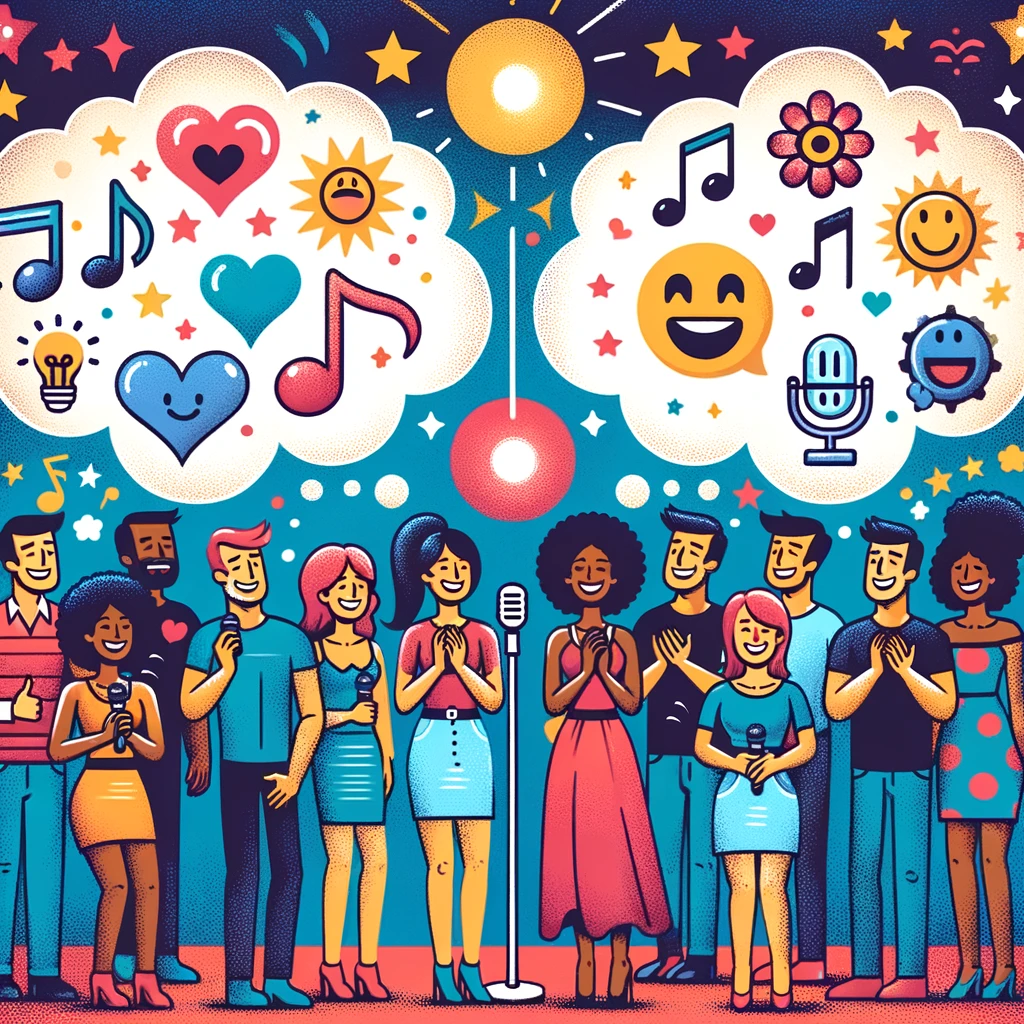The Psychology Behind Song Choice in Karaoke
The psychology behind song choice in karaoke is a multifaceted topic that intertwines aspects of personality, cultural background, social dynamics, and emotional expression. Let’s dive into the various elements that come into play when individuals select a song to perform in front of an audience, whether it be a room full of strangers or a circle of close friends.

Personal Identity and Expression
Karaoke song choices can be seen as a form of self-expression. The lyrics of a song may resonate with a person’s current emotional state or past experiences. A study published in the “Journal of Personality and Social Psychology” found that people often choose songs that have lyrics they relate to on a personal level. The genre, tempo, and mood of the music can also reflect one’s personality—introverts might prefer softer, more introspective songs, while extroverts may opt for upbeat, energetic numbers.
Cultural Influence
Cultural background significantly influences music preferences. Certain songs may be popular in specific regions or amongst particular age groups. When individuals select these songs, they are often reinforcing a sense of belonging or paying homage to their cultural roots. This connection can create a shared experience that transcends individual performance, bonding the singer to the audience through a mutual appreciation of the music.
Mood Regulation
Karaoke can be a means of mood regulation. Some might choose uplifting songs to enhance a celebratory mood, while others may select melancholic tunes to process feelings of sadness or nostalgia. According to a study in the “Journal of Music Therapy,” music can serve as an emotional outlet, allowing people to experience and express emotions in a controlled environment.
Social Considerations
The social setting plays a crucial role in song selection. In a karaoke bar, the aim may often be to entertain or impress the audience, leading to the choice of well-known, crowd-pleasing hits. On the other hand, a private gathering may encourage more personal or humorous selections that have inside meaning to the group.
Desire for Performance and Validation
Karaoke is a performance, and many individuals may choose songs that showcase their vocal abilities. There’s a psychological aspect of seeking validation and applause, which can boost one’s self-esteem and confidence. The phenomenon, often linked to the concept of “social reward,” suggests that positive feedback from others can be a strong motivator in song choice.
Nostalgia and Memory
The connection between nostalgia and memory in the context of karaoke song choice is particularly poignant. Nostalgia, a sentimental longing for the past, often carries a bittersweet blend of happiness and melancholy. This emotion can be a powerful driver in song selection during karaoke sessions for several reasons:
Triggering Fond Memories
Music has the remarkable ability to act as a time machine, transporting individuals back to specific moments or periods in their lives. When people choose old favorites or classic hits, they might be seeking to recapture the feelings and memories associated with those times. For instance, a song that was popular during one’s teenage years may evoke the carefree sensations of youth.
Celebrating Milestones
During karaoke, individuals might pick songs that remind them of significant life events like graduations, weddings, or friendships. Such songs serve as audible markers of personal history, allowing singers and listeners alike to momentarily return to those joyous occasions.
Sharing Personal History with Others
Karaoke can be a deeply communal experience. When people select songs loaded with personal nostalgia, they share a piece of their life story with the audience. This act can create bonds as others may also relate to the song, having their own memories ignited by the performance.
Comfort in Familiarity
Nostalgic songs provide comfort through their familiarity. Singing a well-known song from the past can be reassuring, especially in the potentially vulnerable setting of a public performance. The predictability of the melody and lyrics can ease anxiety, making for a more enjoyable experience.
Coping with Change
As individuals age and encounter life’s inevitable changes, nostalgic songs can serve as anchors to a perceived simpler or happier time. In a rapidly changing world, these songs can be a source of stability and continuity.
Cultural and Generational Connection
Nostalgic songs can bridge generational gaps and cultural divides. Classics that have stood the test of time often resonate across age groups, creating a shared experience that transcends individual backgrounds.
Identity and Self-Reflection
Lastly, nostalgic songs often reflect the evolution of one’s identity. By revisiting the music of their past, individuals engage in a form of self-reflection, assessing their growth and changes over time.
The choice of a nostalgic song in karaoke is thus a multifaceted decision that taps into the deep wells of personal identity, collective memory, and emotional resonance. It’s a way for individuals to not only entertain but also to share and celebrate the enduring impact of music on their lives.
Context of the Event
The event’s context—whether it’s a celebration, a casual get-together, or a themed party—can dictate the song choice. For example, karaoke on a birthday might involve more personalized or humorous songs aimed at the celebrant, while a holiday party might see an uptick in festive tunes.
Ultimately, the psychology behind karaoke song choices is deeply intertwined with the human desire for connection, expression, and recognition. The songs people choose are more than just melodies; they are reflections of their identities, emotions, and social contexts.